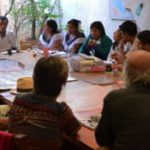Gender equality: the foundation for achieving the Global Goals
By Alaa Murabit and Ashly Yu
Throughout her internship with the Omnis Institute, former Omnis Mentee Ashly Yu researched the impact of gender mainstreaming in achieving the UN Sustainable Development Goals. Her findings and opinions were summarised in an article co-authored with Dr. Alaa Murabit and published on Impakter in October 2017.
Girls’ education is the most cost-effective and practical measure to fulfill Sustainable Development Goal 1: No Poverty. Across the Global South, women are frequently relegated to manual labour positions because of cycles of poverty exacerbated by unequal access to education. Traditional beliefs that women are not worthy of investment prevail, instead of enabling women as agents of economic development. Countries that underinvest in women, either through discrimination or market failures, pay the price through inefficient accumulation of capital and slower economic growth. Furthermore, two-thirds of women in developing countries engage in unpaid labour supplying water and taking care of children. Although their roles as caregivers are invaluable in society, women deserve the same rights as men to pursue education should they choose to expand employment or entrepreneurial opportunities. An education is an invaluable asset towards asserting economic and social rights during a woman’s lifetime, and without investing in girls, developing countries not only squander macroeconomic gains but also perpetuate cycles of inequality to the detriment of sustainable development.
To bring SDG 16 into fruition, countries should invest in grassroots women’s organizations that undertake daily peacebuilding work and who act as seamstresses in mending the regions torn apart by conflict through dialogue and education. Not only should women’s organizations be a greater commitment to national treasuries, but peace and security decision-making bodies need to include more women because they are statistically proven to make peace last. Governments burdened with the seemingly endless bouts of violent conflict must tap into this resource to ensure viable change.
Women and girls have the potential of being stakeholders in sustainable development, by lifting themselves and their families out of poverty with an education; by combatting climate change using their local knowledge; and by broadening peace and security dialogue with their community-building assets. Governments should demonstrate their commitment to gender equality by investing in local women’s organizations and promoting women’s leadership in public policy.
Read the article in full here.



